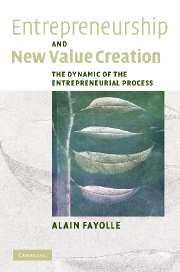Book contents
- Frontmatter
- Contents
- List of figures
- List of tables
- Foreword
- Acknowledgements
- Introduction
- Part I Perceptions of entrepreneurship
- Part II Entrepreneurship and the entrepreneurial system
- Part III Entrepreneurship and entrepreneurial processes
- Part IV Entrepreneurial process dynamics
- 10 Entrepreneurial process trigger phase
- 11 Entrepreneurial process commitment phase
- 12 Entrepreneurial process survival/development phase
- Conclusion
- References
- Index
11 - Entrepreneurial process commitment phase
Published online by Cambridge University Press: 22 September 2009
- Frontmatter
- Contents
- List of figures
- List of tables
- Foreword
- Acknowledgements
- Introduction
- Part I Perceptions of entrepreneurship
- Part II Entrepreneurship and the entrepreneurial system
- Part III Entrepreneurship and entrepreneurial processes
- Part IV Entrepreneurial process dynamics
- 10 Entrepreneurial process trigger phase
- 11 Entrepreneurial process commitment phase
- 12 Entrepreneurial process survival/development phase
- Conclusion
- References
- Index
Summary
I consider the individual's commitment to be a determining variable in understanding the entrepreneurial act and the actual emergence of a company. I see in the individual's commitment a synonym of motivation and implication, and a source of internal energy. Commitment may be partial or total. It is total when it has reached a stage in the process that makes going back all but impossible. The individual, after reaching this point, will go all the way, as the costs of disengagement would be too high. How does commitment start, develop, and evolve throughout the process? How can we model and explain an individual's commitment to a new venture creation process?
This chapter addresses the issue of commitment in the context of new venture creation by an individual who does it for the first time, without any specific experience. My definition of commitment corresponds to the stage when the individual devotes most of his or her time and energy, and financial, intellectual, relational and affective means, to the project or the enterprise. Once committed, the individual does not consider the possibility of going back, which, incidentally, given the investments made, would be far too difficult and would be experienced as a failure.
I will first examine the notions of commitment and escalation of commitment from a more general point of view, before addressing them in the context of entrepreneurship.
- Type
- Chapter
- Information
- Entrepreneurship and New Value CreationThe Dynamic of the Entrepreneurial Process, pp. 177 - 197Publisher: Cambridge University PressPrint publication year: 2007



